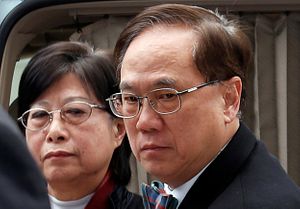Hong Kong’s former chief executive and lifelong public servant Donald Tsang Yam-kuen has been sentenced to 20 months in jail by the High Court for misconduct in public office.
On February 16, Tsang was found guilty of one count of accepting a HK$3.35 million (US$431,000) bribe in the form of renovations on a private penthouse located in Shenzhen, and two counts of misconduct in office, stating that he deliberately concealed the personal negotiations over the penthouse with businessman Bill Wong Cho-bau.
Wong was director of property company East Pacific Holdings, but importantly, was also a major shareholder in radio station Wave Media. At the time in 2010, Wave Media had applied for three digital broadcasting licenses. All were approved.
At the trial, prosecutors said that Selina Tsang Pou Siu-mei, Donald Tsang’s wife of over 40 years, had deposited HK$350,000 into her personal account on July 16 only 35 minutes after another one of Wave Media’s executive directors, David Li Kwok-po withdrew HK$350,000 in cash from the same branch.
In November of 2010, Wave Media received approval for the digital broadcasting license. Less than a fortnight after the approval, a payment of RMB800,000 was transferred from Selina Tsang’s account to East Pacific Holdings. Prosecutors argued that this was payment for the Shenzhen apartment at below market rates, and that the earlier HK$350,000 was payment from Wave Media to help settle the cost of the penthouse.
In February 2011, interior designer Barrie Ho Chow-lai signed a contract to refurbish the Shenzhen penthouse, having been referred by another Wave Media shareholder, Albert Cheng King-hon. In that same month, Donald Tsang requested his permanent secretary nominate Ho for an honor under Hong Kong’s awards and honors system. Tsang approved the nomination in May 2011, but did not disclose his relationship with the designer.
By early 2012, media had started reporting on Tsang’s suspicious activities with high-profile businessmen. At the same time, Tsang announced his plans to retire to Shenzhen. On February 29, 2012, Hong Kong’s Independent Commission Against Corruption opened an investigation into Tsang’s activities. Tsang finished his term in office as Chief Executive on June 30, 2012.
In the ruling, Justice Andrew Chan Hing-wai, the presiding judge, said, “Never in my judicial career have I seen a man fallen from so high.” But he stressed the seriousness of the case “lies in the position the defendant occupied: the office of the chief executive.” As chief executive of Hong Kong, Tsang was accountable to both the people of Hong Kong, and also to the central government.
The public response has been mixed. Donald Tsang had a squeaky clean image as a devout Catholic who remained true to his faith even in the face of the non-religious Communist Chinese government. His stature and trademark bow-tie gave him an almost cartoon-like appearance. Even the media outlets of China and Taiwan were in disbelief at the sentence.
It is understood that Tsang has requested special protection in jail. The protections would include Tsang remaining on his own when possible, including his one hour of daily free time and his regular work duties. Prison authorities have reportedly approved the request.
































